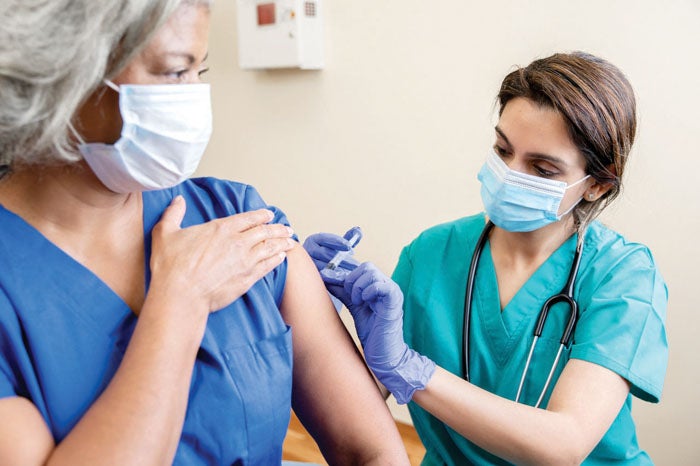Answers to COVID-19 common questions about quarantining, headaches and fertility
Published 12:00 am Thursday, March 18, 2021
|
Getting your Trinity Audio player ready...
|
What to do if you’re exposed after you’re vaccinated
By Cliff Mehrtens
Novant Health
As more of the population becomes vaccinated against COVID-19, questions remain about side effects from your shot and how to treat them. Novant Health physicians use the phrase “expected effects,” because these reactions are to be expected, and are also a sign the vaccine is working.
Below are answers to some of the latest questions.
If I’ve had two COVID-19 vaccinations and become exposed to someone with COVID-19, do I have to go into quarantine?
According to new guidelines from the Centers for Disease Control and Prevention (CDC), people who have had two doses of COVID-19 vaccine and are exposed to someone with COVID-19 could consider not quarantining, if they meet these three criteria:
- It’s been two weeks or more since your second dose
- It’s been within 90 days since you’ve received the vaccine
- You’re not showing any symptoms of COVID-19
Anyone who does not meet those three criteria should follow the CDC’s quarantine guidance of staying home and away from others for 14 days. Irrespective of possible exposure, everyone, including those who have received two vaccinations, should continue wearing a mask, stay at least 6 feet away from others, avoid crowds and poorly ventilated spaces, cover coughs and sneezes, and wash your hands often.
I started to get headaches after my second COVID-19 vaccination. It is mostly on the right side, and is intermittent. What is it?
Headache, along with fever, chills and tiredness, are common after you receive a COVID-19 vaccination. Pain and swelling on the arm where you got the shot is common, too.
Talk to your doctor about taking over-the-counter medicine, such as ibuprofen, aspirin or acetaminophen, for any pain and discomfort after getting vaccinated. You can take these medications to relieve post-vaccination side effects if you have no other medical reasons that prevent you from taking them normally. The side effects from the vaccine should go away in a few days. (See related question on painkillers below.)
How can I tell the difference between headaches caused by the COVID-19 virus and migraines?
Generally, headaches induced by the COVID-19 virus cover your entire head, with severe pain that feels like pressure. It is different from a migraine, which by definition is unilateral (on one side of your head) throbbing with sensitivity to light or sound, or nausea. In some patients, the severe headache of the COVID-19 virus only lasts a few days, while in others, it can last up to months.
Can the frequency or intensity of migraines get worse during this time of COVID-19, if you already suffer from them?
The COVID-19 pandemic and lockdown have resulted in anxiety, depression, social isolation, and changes in people’s daily routine and activity. Those factors can often trigger migraines. To help prevent those triggers from making your migraines worse or more frequent, do your best to maintain a routine, lower your stress levels, practice a healthy lifestyle (eating, exercising, sleep, etc.) and reach out to family and friends to connect via phone or video, if you’re physically isolated.
Is a gaiter still a safe choice as a mask?
If you wear a gaiter, choose one that has two layers or fold it to make two layers, according to the Centers for Disease Control and Prevention.
Overall, it is important to choose a mask that has two or more layers of washable, breathable fabric, completely covers your nose and mouth, and fits snugly against the sides of your face, to prevent gaps.
Public health experts have said that double masking may make sense for people who are in high-risk situations or have medical conditions that put them at high risk.
How long should I wait to take acetaminophen or ibuprofen after I receive my second COVID-19 vaccination?
The CDC said taking pain-relieving medication is OK to treat post-vaccination symptoms, if medically appropriate, but doesn’t list a timeframe. However, it is important to not take those types of medication before your COVID-19 vaccination, as it’s not yet known if it could interfere with the vaccine-induced antibody responses.
Does the COVID-19 vaccine affect fertility? Can the vaccine attack the placenta?
From the Centers for Disease Control and Prevention: “If you are pregnant, you may choose to be vaccinated when it’s available to you. There is currently no evidence that antibodies formed from COVID-19 vaccination cause any problem with pregnancy, including the development of the placenta.”
“People who are trying to become pregnant now or who plan to try in the future may receive the COVID-19 vaccine when it becomes available to them. There is no evidence that fertility problems are a side effect of any vaccine, including COVID-19 vaccines. There is no routine recommendation for taking a pregnancy test before you get a COVID-19 vaccine.”




